Performance Management and Training Effectiveness
VerifiedAdded on 2020/05/04
|15
|3680
|32
AI Summary
This assignment delves into the critical relationship between performance management practices, training interventions, and overall firm performance. It encourages students to critically analyze various performance assessment tools, the impact of training on job performance, and the development of a comprehensive model linking these elements. The assignment also prompts exploration of future research directions in this dynamic field.
Contribute Materials
Your contribution can guide someone’s learning journey. Share your
documents today.
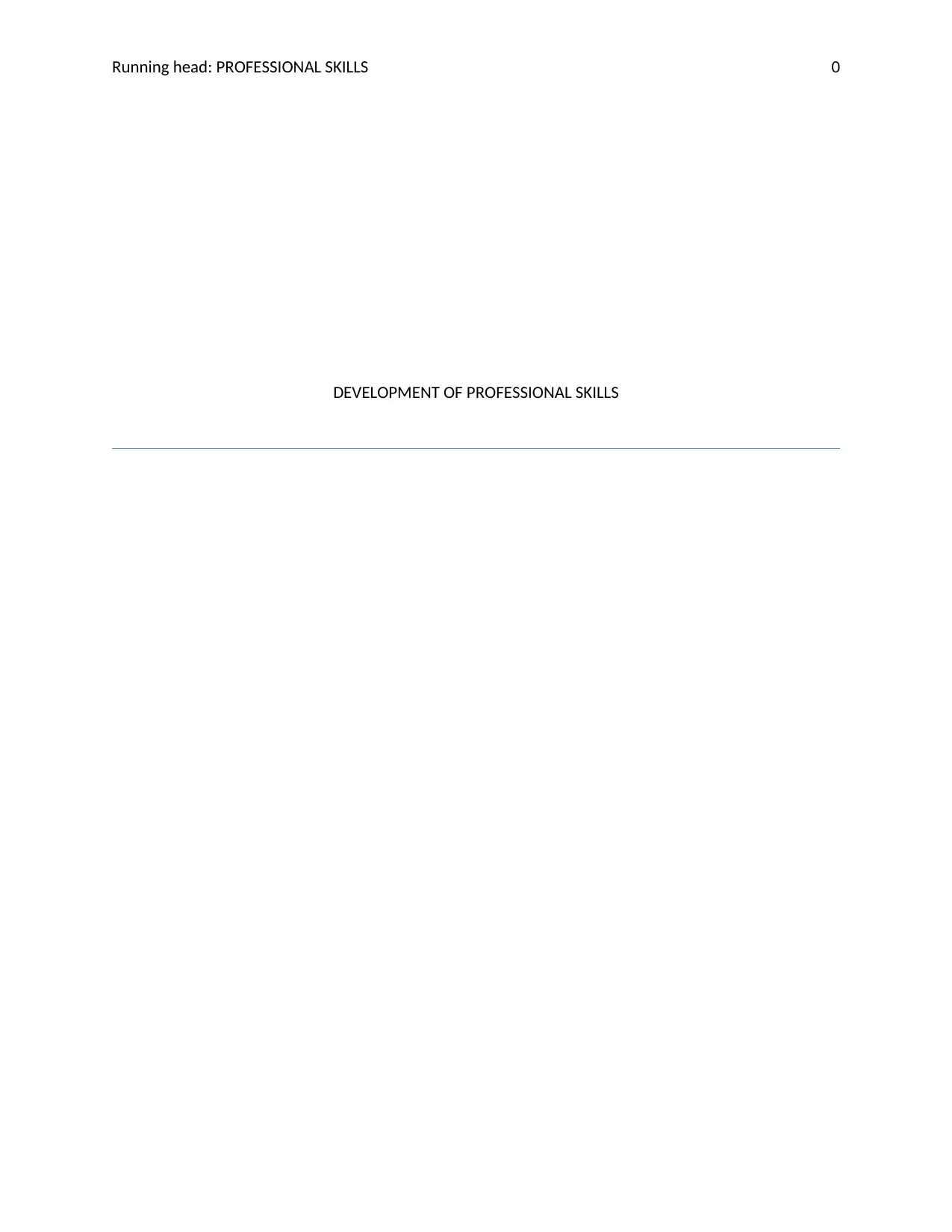
Running head: PROFESSIONAL SKILLS 0
DEVELOPMENT OF PROFESSIONAL SKILLS
DEVELOPMENT OF PROFESSIONAL SKILLS
Secure Best Marks with AI Grader
Need help grading? Try our AI Grader for instant feedback on your assignments.
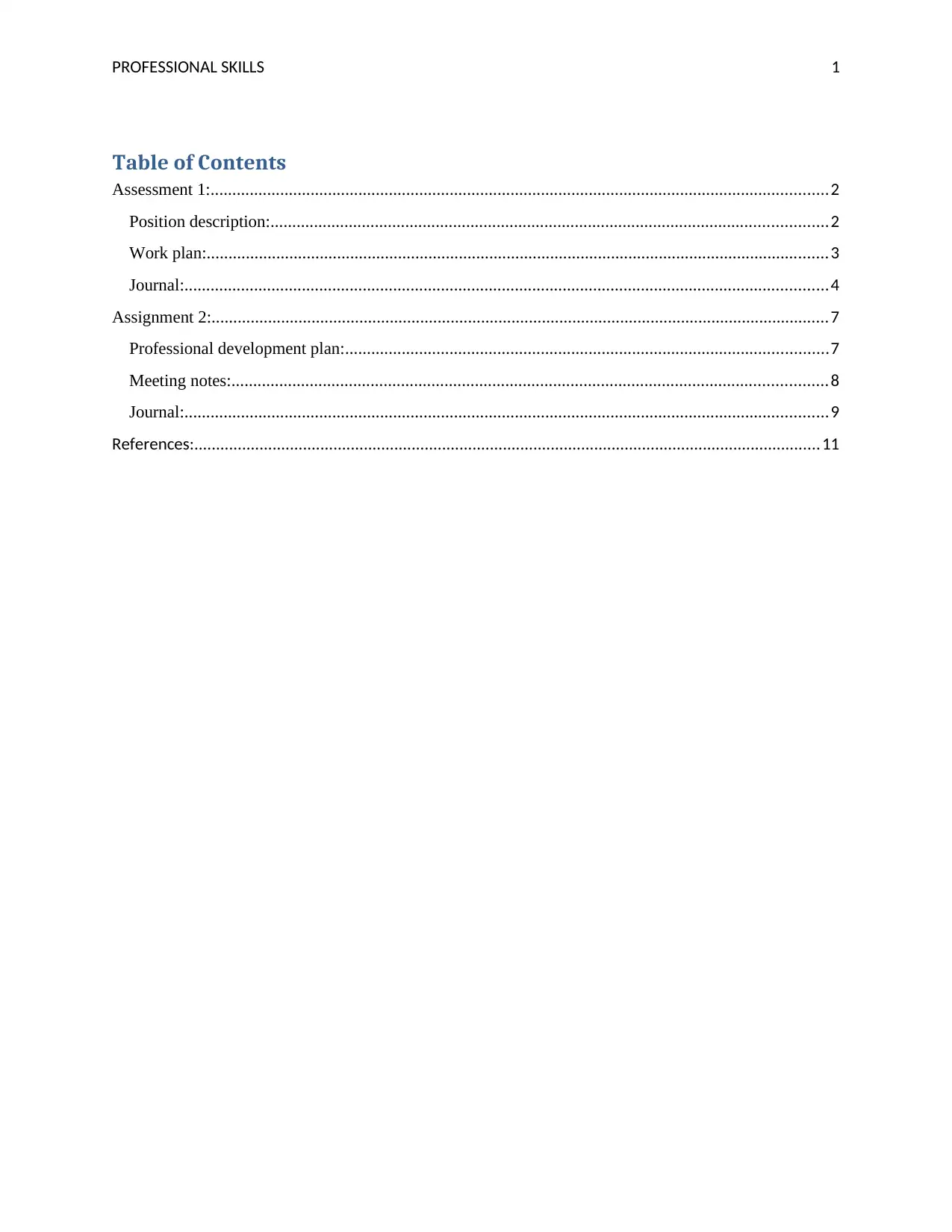
PROFESSIONAL SKILLS 1
Table of Contents
Assessment 1:..............................................................................................................................................2
Position description:................................................................................................................................2
Work plan:...............................................................................................................................................3
Journal:....................................................................................................................................................4
Assignment 2:..............................................................................................................................................7
Professional development plan:...............................................................................................................7
Meeting notes:.........................................................................................................................................8
Journal:....................................................................................................................................................9
References:................................................................................................................................................11
Table of Contents
Assessment 1:..............................................................................................................................................2
Position description:................................................................................................................................2
Work plan:...............................................................................................................................................3
Journal:....................................................................................................................................................4
Assignment 2:..............................................................................................................................................7
Professional development plan:...............................................................................................................7
Meeting notes:.........................................................................................................................................8
Journal:....................................................................................................................................................9
References:................................................................................................................................................11
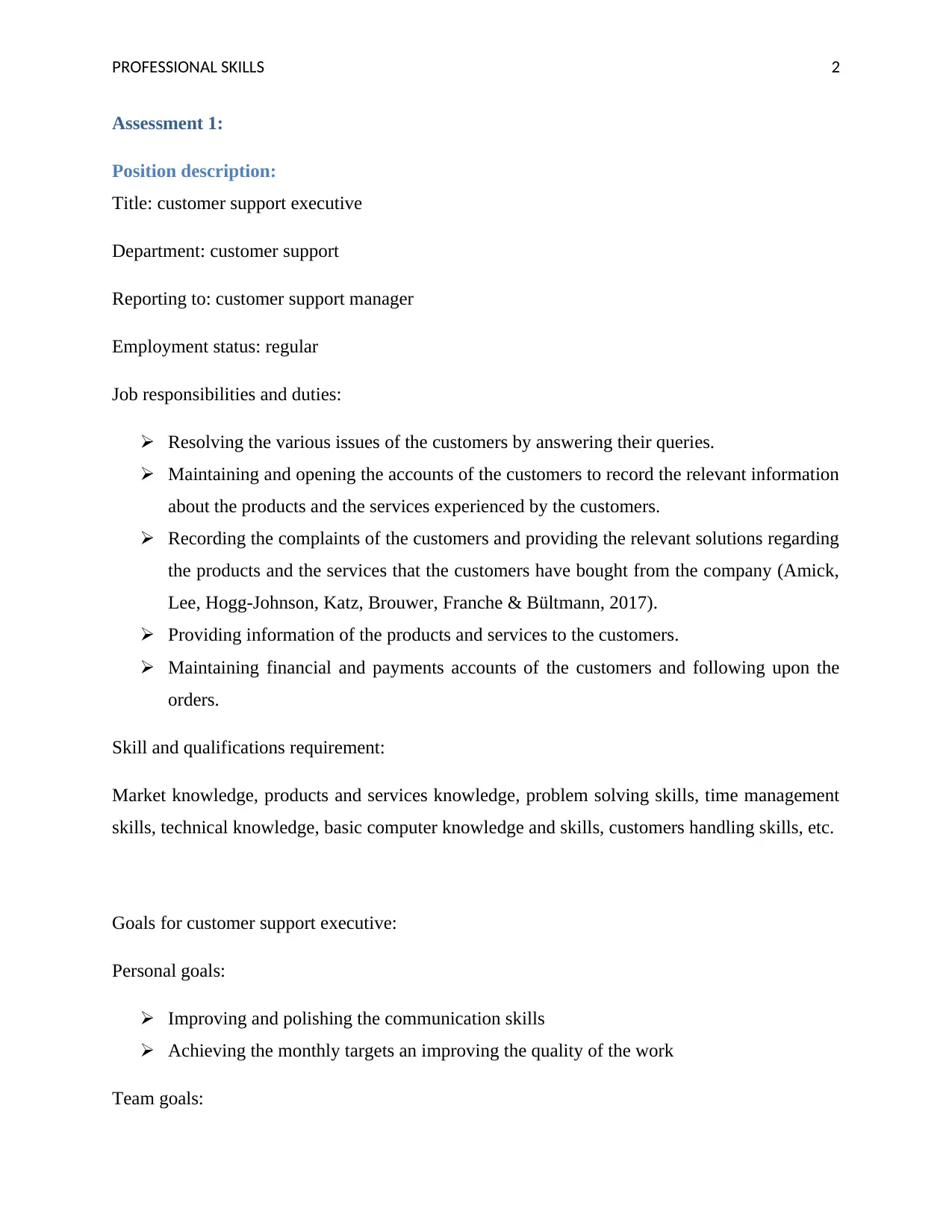
PROFESSIONAL SKILLS 2
Assessment 1:
Position description:
Title: customer support executive
Department: customer support
Reporting to: customer support manager
Employment status: regular
Job responsibilities and duties:
Resolving the various issues of the customers by answering their queries.
Maintaining and opening the accounts of the customers to record the relevant information
about the products and the services experienced by the customers.
Recording the complaints of the customers and providing the relevant solutions regarding
the products and the services that the customers have bought from the company (Amick,
Lee, Hogg-Johnson, Katz, Brouwer, Franche & Bültmann, 2017).
Providing information of the products and services to the customers.
Maintaining financial and payments accounts of the customers and following upon the
orders.
Skill and qualifications requirement:
Market knowledge, products and services knowledge, problem solving skills, time management
skills, technical knowledge, basic computer knowledge and skills, customers handling skills, etc.
Goals for customer support executive:
Personal goals:
Improving and polishing the communication skills
Achieving the monthly targets an improving the quality of the work
Team goals:
Assessment 1:
Position description:
Title: customer support executive
Department: customer support
Reporting to: customer support manager
Employment status: regular
Job responsibilities and duties:
Resolving the various issues of the customers by answering their queries.
Maintaining and opening the accounts of the customers to record the relevant information
about the products and the services experienced by the customers.
Recording the complaints of the customers and providing the relevant solutions regarding
the products and the services that the customers have bought from the company (Amick,
Lee, Hogg-Johnson, Katz, Brouwer, Franche & Bültmann, 2017).
Providing information of the products and services to the customers.
Maintaining financial and payments accounts of the customers and following upon the
orders.
Skill and qualifications requirement:
Market knowledge, products and services knowledge, problem solving skills, time management
skills, technical knowledge, basic computer knowledge and skills, customers handling skills, etc.
Goals for customer support executive:
Personal goals:
Improving and polishing the communication skills
Achieving the monthly targets an improving the quality of the work
Team goals:
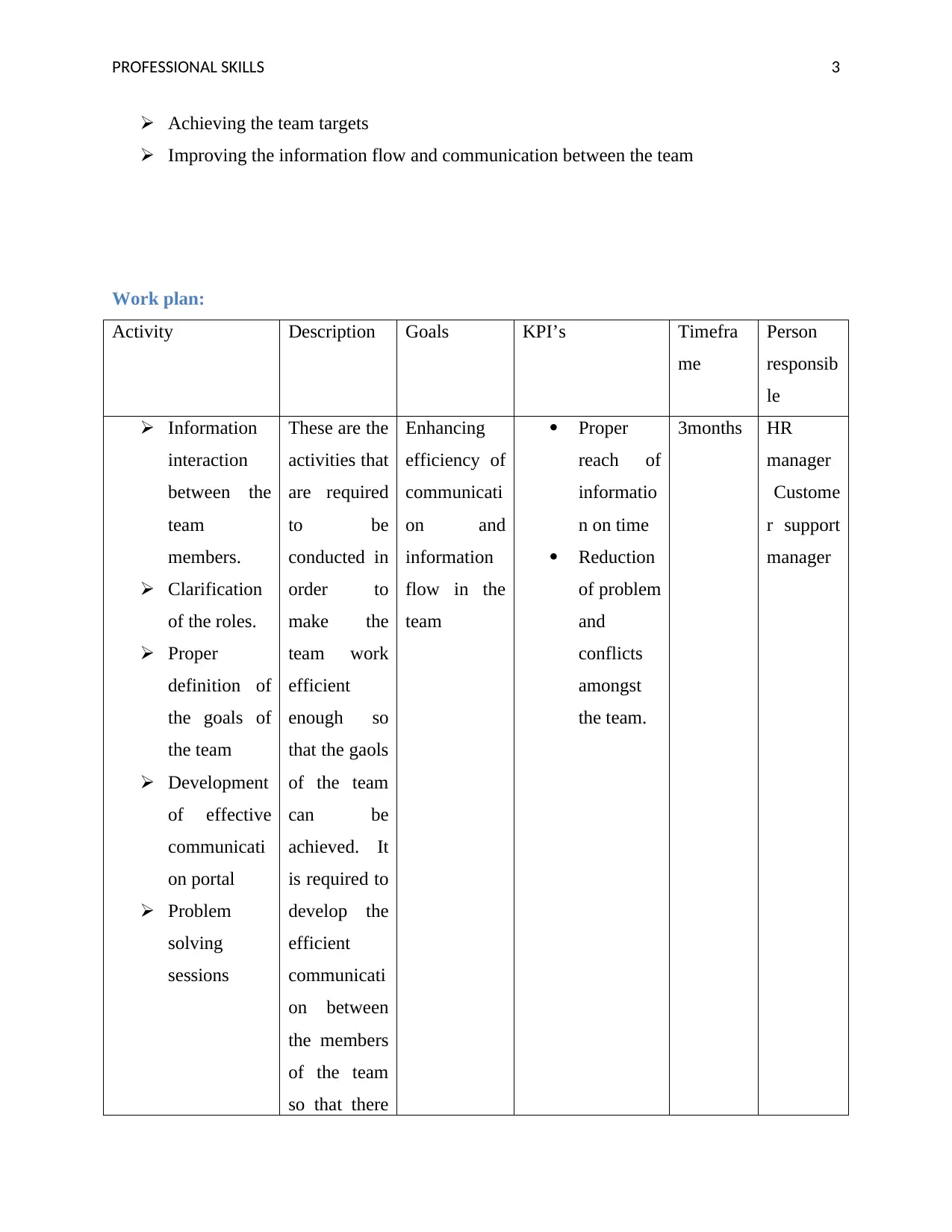
PROFESSIONAL SKILLS 3
Achieving the team targets
Improving the information flow and communication between the team
Work plan:
Activity Description Goals KPI’s Timefra
me
Person
responsib
le
Information
interaction
between the
team
members.
Clarification
of the roles.
Proper
definition of
the goals of
the team
Development
of effective
communicati
on portal
Problem
solving
sessions
These are the
activities that
are required
to be
conducted in
order to
make the
team work
efficient
enough so
that the gaols
of the team
can be
achieved. It
is required to
develop the
efficient
communicati
on between
the members
of the team
so that there
Enhancing
efficiency of
communicati
on and
information
flow in the
team
Proper
reach of
informatio
n on time
Reduction
of problem
and
conflicts
amongst
the team.
3months HR
manager
Custome
r support
manager
Achieving the team targets
Improving the information flow and communication between the team
Work plan:
Activity Description Goals KPI’s Timefra
me
Person
responsib
le
Information
interaction
between the
team
members.
Clarification
of the roles.
Proper
definition of
the goals of
the team
Development
of effective
communicati
on portal
Problem
solving
sessions
These are the
activities that
are required
to be
conducted in
order to
make the
team work
efficient
enough so
that the gaols
of the team
can be
achieved. It
is required to
develop the
efficient
communicati
on between
the members
of the team
so that there
Enhancing
efficiency of
communicati
on and
information
flow in the
team
Proper
reach of
informatio
n on time
Reduction
of problem
and
conflicts
amongst
the team.
3months HR
manager
Custome
r support
manager
Secure Best Marks with AI Grader
Need help grading? Try our AI Grader for instant feedback on your assignments.
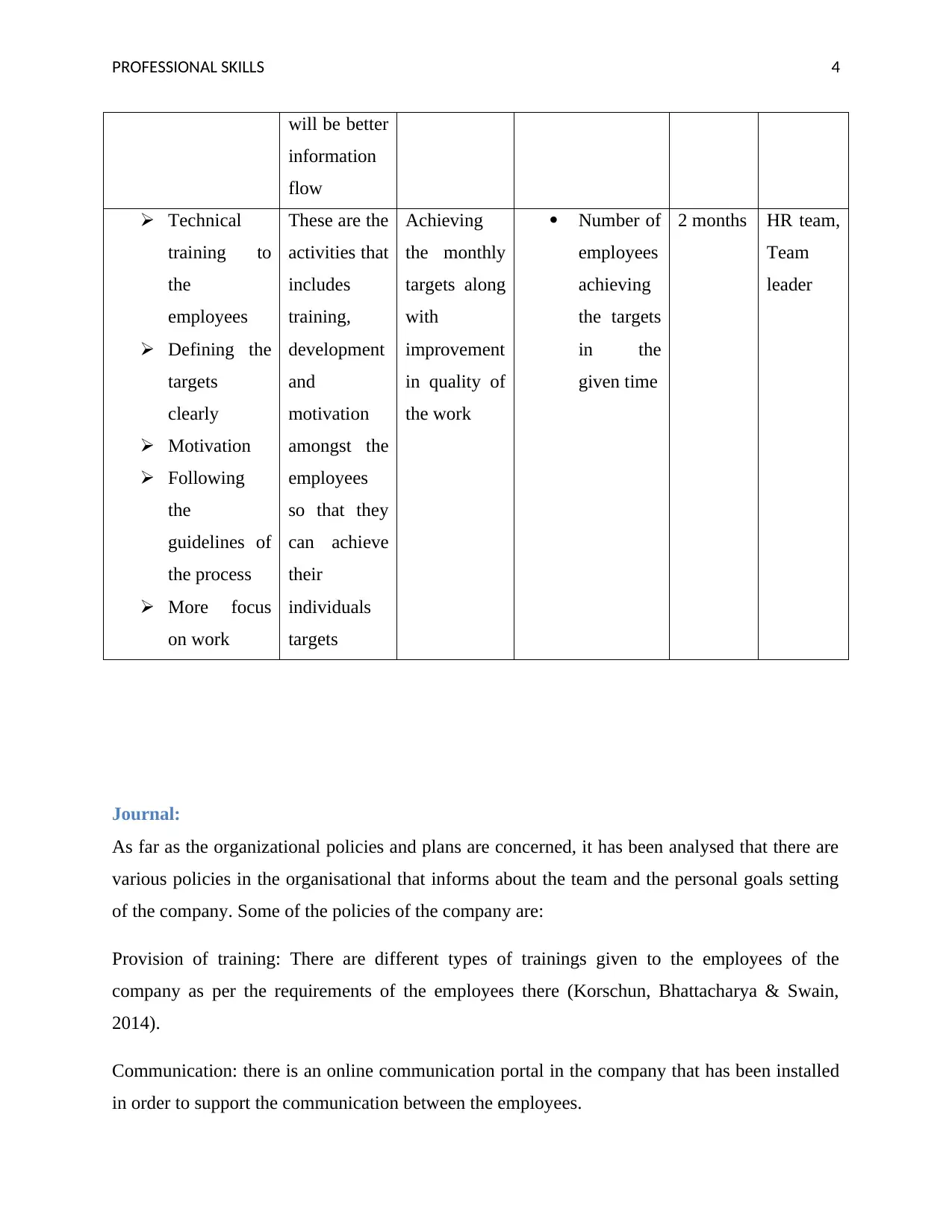
PROFESSIONAL SKILLS 4
will be better
information
flow
Technical
training to
the
employees
Defining the
targets
clearly
Motivation
Following
the
guidelines of
the process
More focus
on work
These are the
activities that
includes
training,
development
and
motivation
amongst the
employees
so that they
can achieve
their
individuals
targets
Achieving
the monthly
targets along
with
improvement
in quality of
the work
Number of
employees
achieving
the targets
in the
given time
2 months HR team,
Team
leader
Journal:
As far as the organizational policies and plans are concerned, it has been analysed that there are
various policies in the organisational that informs about the team and the personal goals setting
of the company. Some of the policies of the company are:
Provision of training: There are different types of trainings given to the employees of the
company as per the requirements of the employees there (Korschun, Bhattacharya & Swain,
2014).
Communication: there is an online communication portal in the company that has been installed
in order to support the communication between the employees.
will be better
information
flow
Technical
training to
the
employees
Defining the
targets
clearly
Motivation
Following
the
guidelines of
the process
More focus
on work
These are the
activities that
includes
training,
development
and
motivation
amongst the
employees
so that they
can achieve
their
individuals
targets
Achieving
the monthly
targets along
with
improvement
in quality of
the work
Number of
employees
achieving
the targets
in the
given time
2 months HR team,
Team
leader
Journal:
As far as the organizational policies and plans are concerned, it has been analysed that there are
various policies in the organisational that informs about the team and the personal goals setting
of the company. Some of the policies of the company are:
Provision of training: There are different types of trainings given to the employees of the
company as per the requirements of the employees there (Korschun, Bhattacharya & Swain,
2014).
Communication: there is an online communication portal in the company that has been installed
in order to support the communication between the employees.
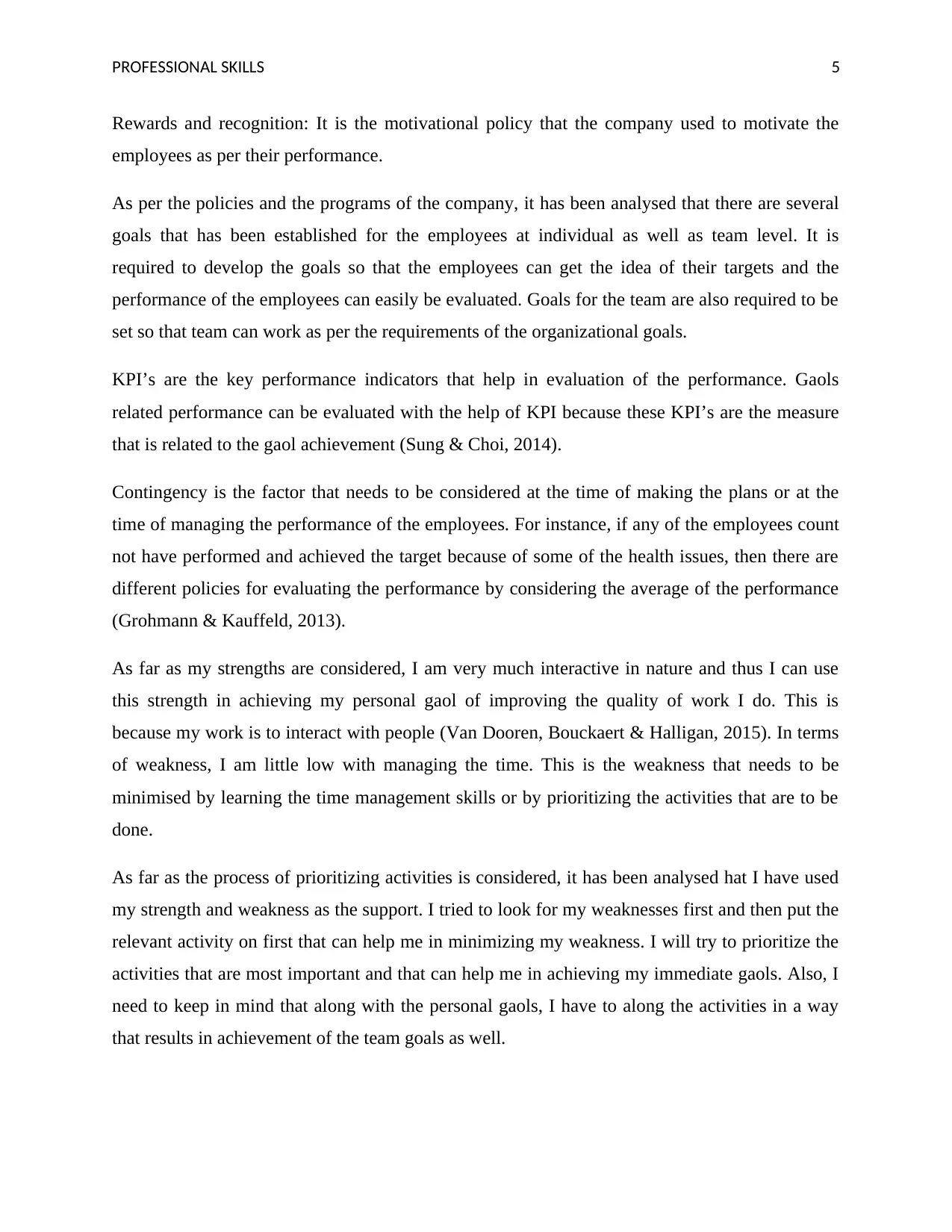
PROFESSIONAL SKILLS 5
Rewards and recognition: It is the motivational policy that the company used to motivate the
employees as per their performance.
As per the policies and the programs of the company, it has been analysed that there are several
goals that has been established for the employees at individual as well as team level. It is
required to develop the goals so that the employees can get the idea of their targets and the
performance of the employees can easily be evaluated. Goals for the team are also required to be
set so that team can work as per the requirements of the organizational goals.
KPI’s are the key performance indicators that help in evaluation of the performance. Gaols
related performance can be evaluated with the help of KPI because these KPI’s are the measure
that is related to the gaol achievement (Sung & Choi, 2014).
Contingency is the factor that needs to be considered at the time of making the plans or at the
time of managing the performance of the employees. For instance, if any of the employees count
not have performed and achieved the target because of some of the health issues, then there are
different policies for evaluating the performance by considering the average of the performance
(Grohmann & Kauffeld, 2013).
As far as my strengths are considered, I am very much interactive in nature and thus I can use
this strength in achieving my personal gaol of improving the quality of work I do. This is
because my work is to interact with people (Van Dooren, Bouckaert & Halligan, 2015). In terms
of weakness, I am little low with managing the time. This is the weakness that needs to be
minimised by learning the time management skills or by prioritizing the activities that are to be
done.
As far as the process of prioritizing activities is considered, it has been analysed hat I have used
my strength and weakness as the support. I tried to look for my weaknesses first and then put the
relevant activity on first that can help me in minimizing my weakness. I will try to prioritize the
activities that are most important and that can help me in achieving my immediate gaols. Also, I
need to keep in mind that along with the personal gaols, I have to along the activities in a way
that results in achievement of the team goals as well.
Rewards and recognition: It is the motivational policy that the company used to motivate the
employees as per their performance.
As per the policies and the programs of the company, it has been analysed that there are several
goals that has been established for the employees at individual as well as team level. It is
required to develop the goals so that the employees can get the idea of their targets and the
performance of the employees can easily be evaluated. Goals for the team are also required to be
set so that team can work as per the requirements of the organizational goals.
KPI’s are the key performance indicators that help in evaluation of the performance. Gaols
related performance can be evaluated with the help of KPI because these KPI’s are the measure
that is related to the gaol achievement (Sung & Choi, 2014).
Contingency is the factor that needs to be considered at the time of making the plans or at the
time of managing the performance of the employees. For instance, if any of the employees count
not have performed and achieved the target because of some of the health issues, then there are
different policies for evaluating the performance by considering the average of the performance
(Grohmann & Kauffeld, 2013).
As far as my strengths are considered, I am very much interactive in nature and thus I can use
this strength in achieving my personal gaol of improving the quality of work I do. This is
because my work is to interact with people (Van Dooren, Bouckaert & Halligan, 2015). In terms
of weakness, I am little low with managing the time. This is the weakness that needs to be
minimised by learning the time management skills or by prioritizing the activities that are to be
done.
As far as the process of prioritizing activities is considered, it has been analysed hat I have used
my strength and weakness as the support. I tried to look for my weaknesses first and then put the
relevant activity on first that can help me in minimizing my weakness. I will try to prioritize the
activities that are most important and that can help me in achieving my immediate gaols. Also, I
need to keep in mind that along with the personal gaols, I have to along the activities in a way
that results in achievement of the team goals as well.
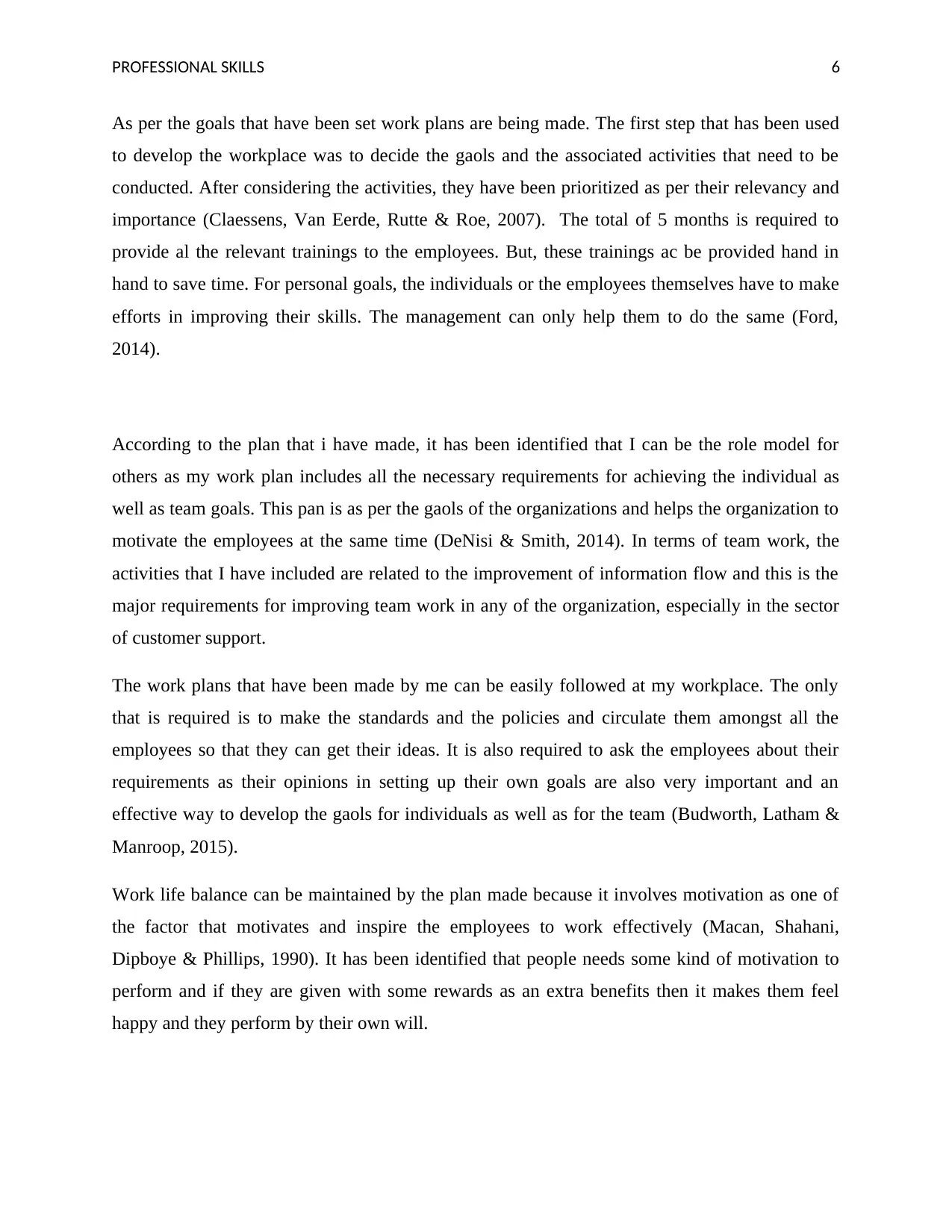
PROFESSIONAL SKILLS 6
As per the goals that have been set work plans are being made. The first step that has been used
to develop the workplace was to decide the gaols and the associated activities that need to be
conducted. After considering the activities, they have been prioritized as per their relevancy and
importance (Claessens, Van Eerde, Rutte & Roe, 2007). The total of 5 months is required to
provide al the relevant trainings to the employees. But, these trainings ac be provided hand in
hand to save time. For personal goals, the individuals or the employees themselves have to make
efforts in improving their skills. The management can only help them to do the same (Ford,
2014).
According to the plan that i have made, it has been identified that I can be the role model for
others as my work plan includes all the necessary requirements for achieving the individual as
well as team goals. This pan is as per the gaols of the organizations and helps the organization to
motivate the employees at the same time (DeNisi & Smith, 2014). In terms of team work, the
activities that I have included are related to the improvement of information flow and this is the
major requirements for improving team work in any of the organization, especially in the sector
of customer support.
The work plans that have been made by me can be easily followed at my workplace. The only
that is required is to make the standards and the policies and circulate them amongst all the
employees so that they can get their ideas. It is also required to ask the employees about their
requirements as their opinions in setting up their own goals are also very important and an
effective way to develop the gaols for individuals as well as for the team (Budworth, Latham &
Manroop, 2015).
Work life balance can be maintained by the plan made because it involves motivation as one of
the factor that motivates and inspire the employees to work effectively (Macan, Shahani,
Dipboye & Phillips, 1990). It has been identified that people needs some kind of motivation to
perform and if they are given with some rewards as an extra benefits then it makes them feel
happy and they perform by their own will.
As per the goals that have been set work plans are being made. The first step that has been used
to develop the workplace was to decide the gaols and the associated activities that need to be
conducted. After considering the activities, they have been prioritized as per their relevancy and
importance (Claessens, Van Eerde, Rutte & Roe, 2007). The total of 5 months is required to
provide al the relevant trainings to the employees. But, these trainings ac be provided hand in
hand to save time. For personal goals, the individuals or the employees themselves have to make
efforts in improving their skills. The management can only help them to do the same (Ford,
2014).
According to the plan that i have made, it has been identified that I can be the role model for
others as my work plan includes all the necessary requirements for achieving the individual as
well as team goals. This pan is as per the gaols of the organizations and helps the organization to
motivate the employees at the same time (DeNisi & Smith, 2014). In terms of team work, the
activities that I have included are related to the improvement of information flow and this is the
major requirements for improving team work in any of the organization, especially in the sector
of customer support.
The work plans that have been made by me can be easily followed at my workplace. The only
that is required is to make the standards and the policies and circulate them amongst all the
employees so that they can get their ideas. It is also required to ask the employees about their
requirements as their opinions in setting up their own goals are also very important and an
effective way to develop the gaols for individuals as well as for the team (Budworth, Latham &
Manroop, 2015).
Work life balance can be maintained by the plan made because it involves motivation as one of
the factor that motivates and inspire the employees to work effectively (Macan, Shahani,
Dipboye & Phillips, 1990). It has been identified that people needs some kind of motivation to
perform and if they are given with some rewards as an extra benefits then it makes them feel
happy and they perform by their own will.
Paraphrase This Document
Need a fresh take? Get an instant paraphrase of this document with our AI Paraphraser
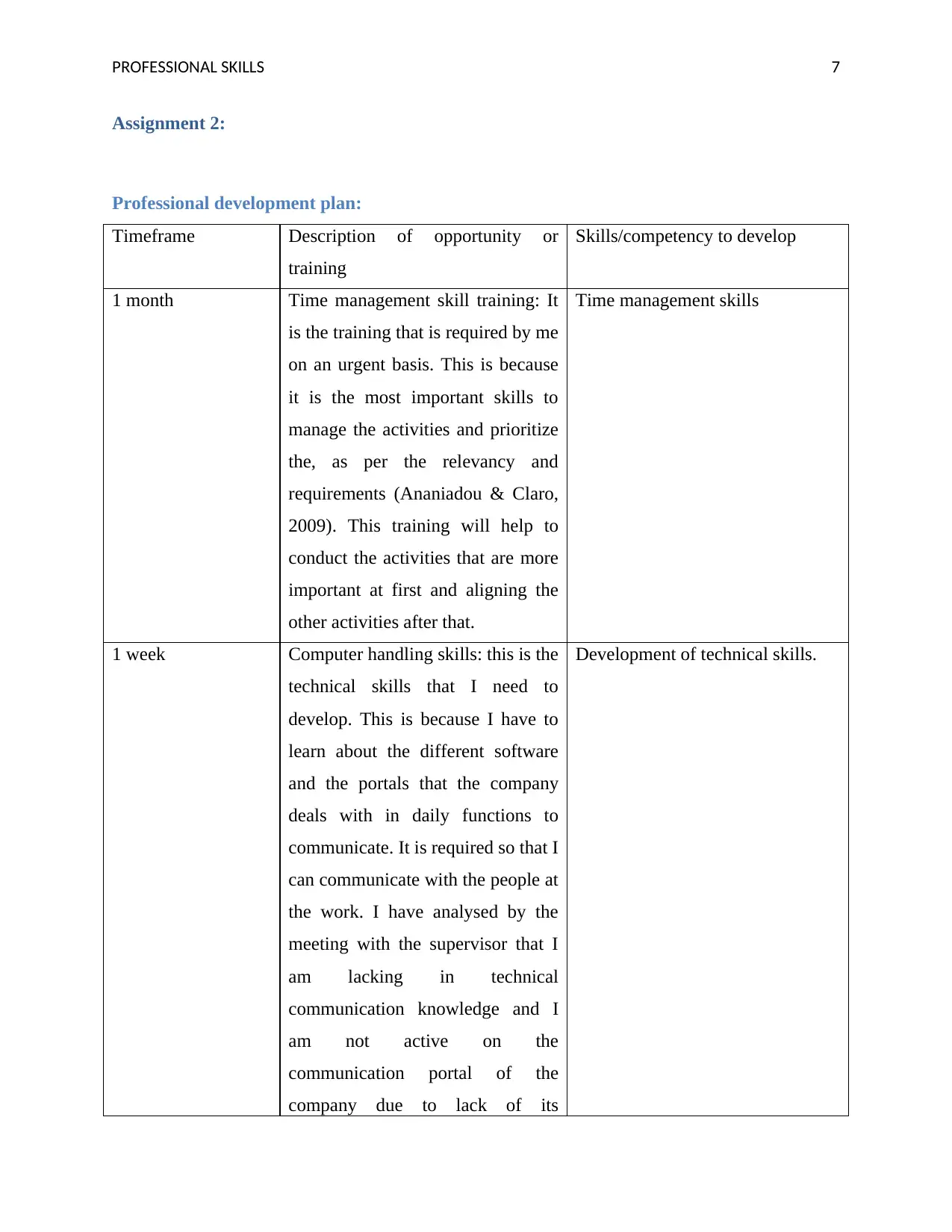
PROFESSIONAL SKILLS 7
Assignment 2:
Professional development plan:
Timeframe Description of opportunity or
training
Skills/competency to develop
1 month Time management skill training: It
is the training that is required by me
on an urgent basis. This is because
it is the most important skills to
manage the activities and prioritize
the, as per the relevancy and
requirements (Ananiadou & Claro,
2009). This training will help to
conduct the activities that are more
important at first and aligning the
other activities after that.
Time management skills
1 week Computer handling skills: this is the
technical skills that I need to
develop. This is because I have to
learn about the different software
and the portals that the company
deals with in daily functions to
communicate. It is required so that I
can communicate with the people at
the work. I have analysed by the
meeting with the supervisor that I
am lacking in technical
communication knowledge and I
am not active on the
communication portal of the
company due to lack of its
Development of technical skills.
Assignment 2:
Professional development plan:
Timeframe Description of opportunity or
training
Skills/competency to develop
1 month Time management skill training: It
is the training that is required by me
on an urgent basis. This is because
it is the most important skills to
manage the activities and prioritize
the, as per the relevancy and
requirements (Ananiadou & Claro,
2009). This training will help to
conduct the activities that are more
important at first and aligning the
other activities after that.
Time management skills
1 week Computer handling skills: this is the
technical skills that I need to
develop. This is because I have to
learn about the different software
and the portals that the company
deals with in daily functions to
communicate. It is required so that I
can communicate with the people at
the work. I have analysed by the
meeting with the supervisor that I
am lacking in technical
communication knowledge and I
am not active on the
communication portal of the
company due to lack of its
Development of technical skills.
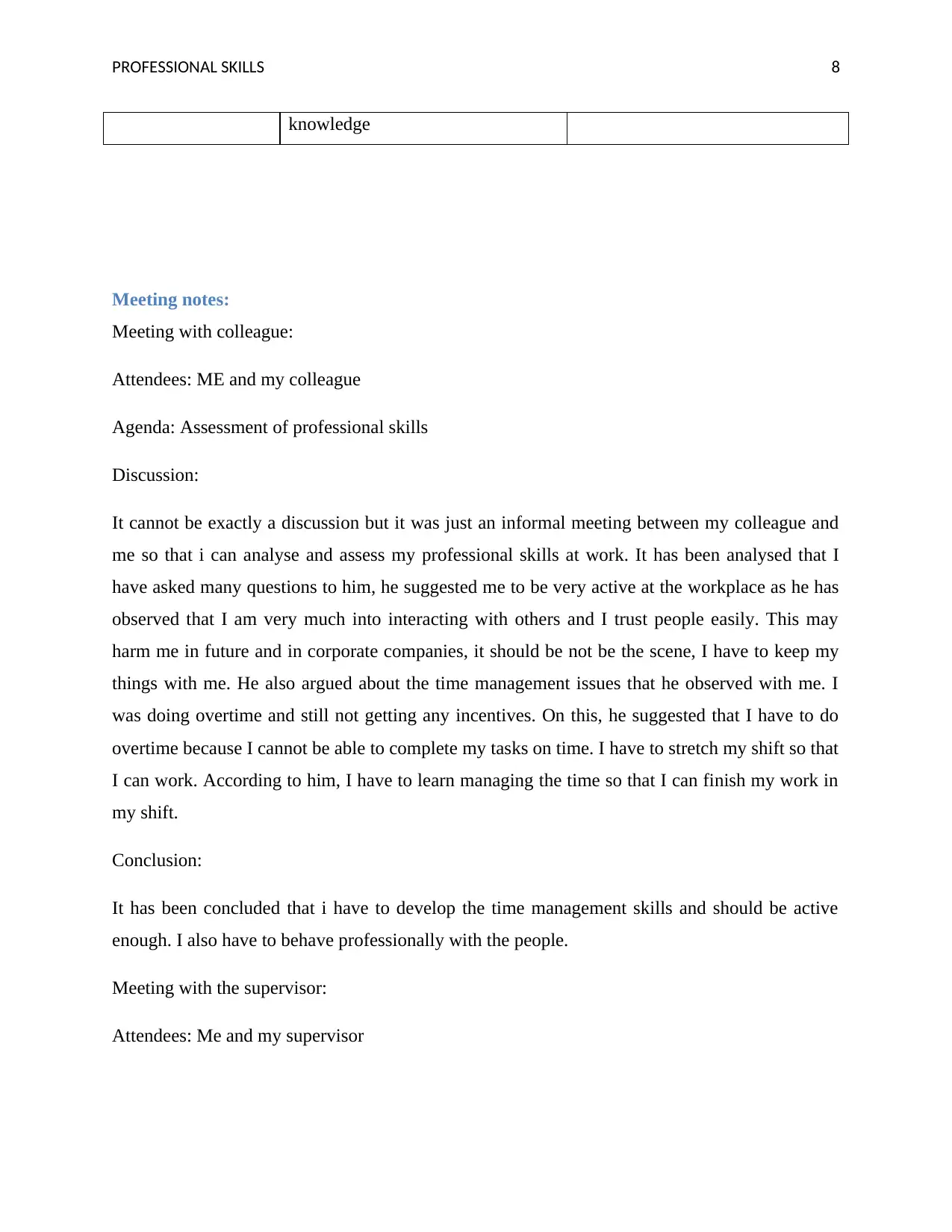
PROFESSIONAL SKILLS 8
knowledge
Meeting notes:
Meeting with colleague:
Attendees: ME and my colleague
Agenda: Assessment of professional skills
Discussion:
It cannot be exactly a discussion but it was just an informal meeting between my colleague and
me so that i can analyse and assess my professional skills at work. It has been analysed that I
have asked many questions to him, he suggested me to be very active at the workplace as he has
observed that I am very much into interacting with others and I trust people easily. This may
harm me in future and in corporate companies, it should be not be the scene, I have to keep my
things with me. He also argued about the time management issues that he observed with me. I
was doing overtime and still not getting any incentives. On this, he suggested that I have to do
overtime because I cannot be able to complete my tasks on time. I have to stretch my shift so that
I can work. According to him, I have to learn managing the time so that I can finish my work in
my shift.
Conclusion:
It has been concluded that i have to develop the time management skills and should be active
enough. I also have to behave professionally with the people.
Meeting with the supervisor:
Attendees: Me and my supervisor
knowledge
Meeting notes:
Meeting with colleague:
Attendees: ME and my colleague
Agenda: Assessment of professional skills
Discussion:
It cannot be exactly a discussion but it was just an informal meeting between my colleague and
me so that i can analyse and assess my professional skills at work. It has been analysed that I
have asked many questions to him, he suggested me to be very active at the workplace as he has
observed that I am very much into interacting with others and I trust people easily. This may
harm me in future and in corporate companies, it should be not be the scene, I have to keep my
things with me. He also argued about the time management issues that he observed with me. I
was doing overtime and still not getting any incentives. On this, he suggested that I have to do
overtime because I cannot be able to complete my tasks on time. I have to stretch my shift so that
I can work. According to him, I have to learn managing the time so that I can finish my work in
my shift.
Conclusion:
It has been concluded that i have to develop the time management skills and should be active
enough. I also have to behave professionally with the people.
Meeting with the supervisor:
Attendees: Me and my supervisor
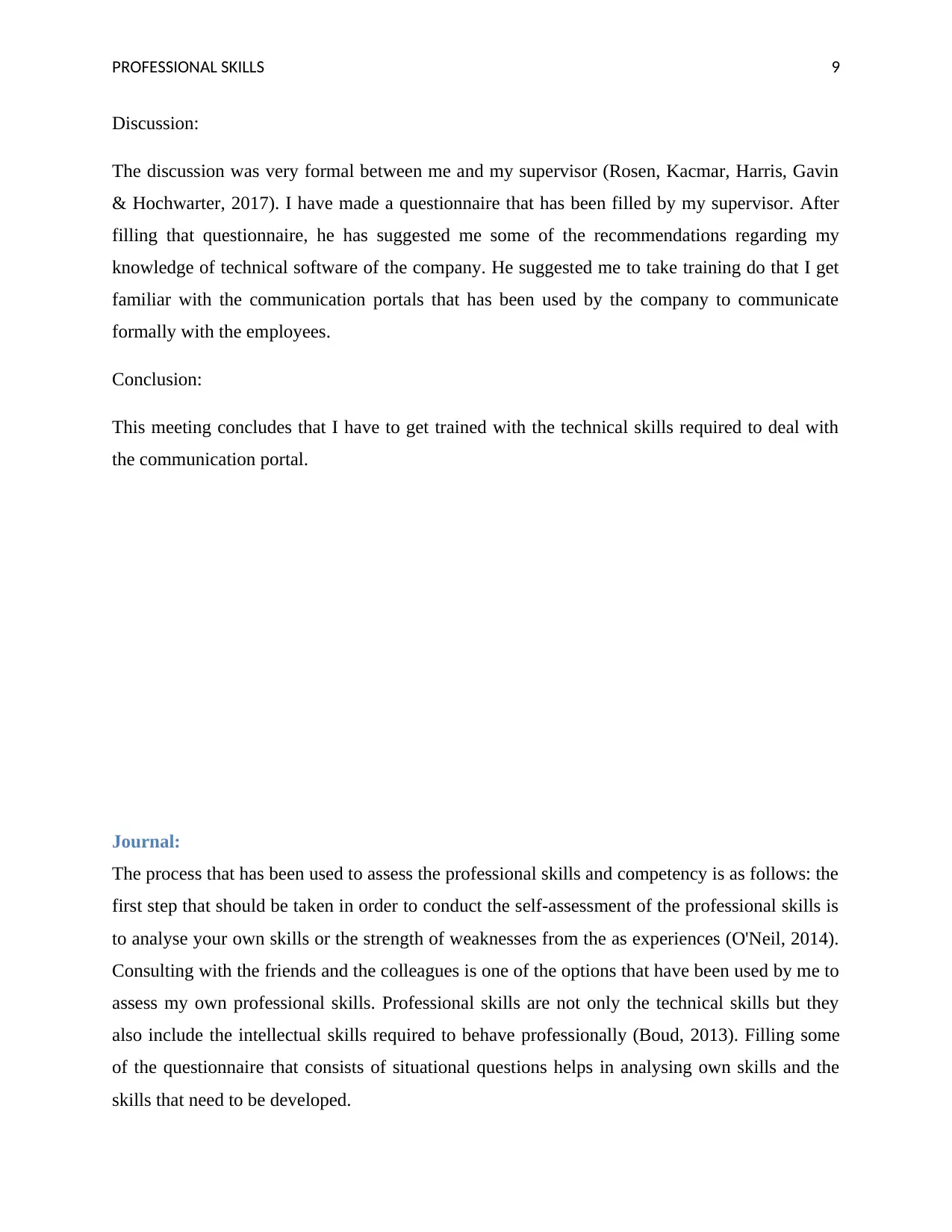
PROFESSIONAL SKILLS 9
Discussion:
The discussion was very formal between me and my supervisor (Rosen, Kacmar, Harris, Gavin
& Hochwarter, 2017). I have made a questionnaire that has been filled by my supervisor. After
filling that questionnaire, he has suggested me some of the recommendations regarding my
knowledge of technical software of the company. He suggested me to take training do that I get
familiar with the communication portals that has been used by the company to communicate
formally with the employees.
Conclusion:
This meeting concludes that I have to get trained with the technical skills required to deal with
the communication portal.
Journal:
The process that has been used to assess the professional skills and competency is as follows: the
first step that should be taken in order to conduct the self-assessment of the professional skills is
to analyse your own skills or the strength of weaknesses from the as experiences (O'Neil, 2014).
Consulting with the friends and the colleagues is one of the options that have been used by me to
assess my own professional skills. Professional skills are not only the technical skills but they
also include the intellectual skills required to behave professionally (Boud, 2013). Filling some
of the questionnaire that consists of situational questions helps in analysing own skills and the
skills that need to be developed.
Discussion:
The discussion was very formal between me and my supervisor (Rosen, Kacmar, Harris, Gavin
& Hochwarter, 2017). I have made a questionnaire that has been filled by my supervisor. After
filling that questionnaire, he has suggested me some of the recommendations regarding my
knowledge of technical software of the company. He suggested me to take training do that I get
familiar with the communication portals that has been used by the company to communicate
formally with the employees.
Conclusion:
This meeting concludes that I have to get trained with the technical skills required to deal with
the communication portal.
Journal:
The process that has been used to assess the professional skills and competency is as follows: the
first step that should be taken in order to conduct the self-assessment of the professional skills is
to analyse your own skills or the strength of weaknesses from the as experiences (O'Neil, 2014).
Consulting with the friends and the colleagues is one of the options that have been used by me to
assess my own professional skills. Professional skills are not only the technical skills but they
also include the intellectual skills required to behave professionally (Boud, 2013). Filling some
of the questionnaire that consists of situational questions helps in analysing own skills and the
skills that need to be developed.
Secure Best Marks with AI Grader
Need help grading? Try our AI Grader for instant feedback on your assignments.
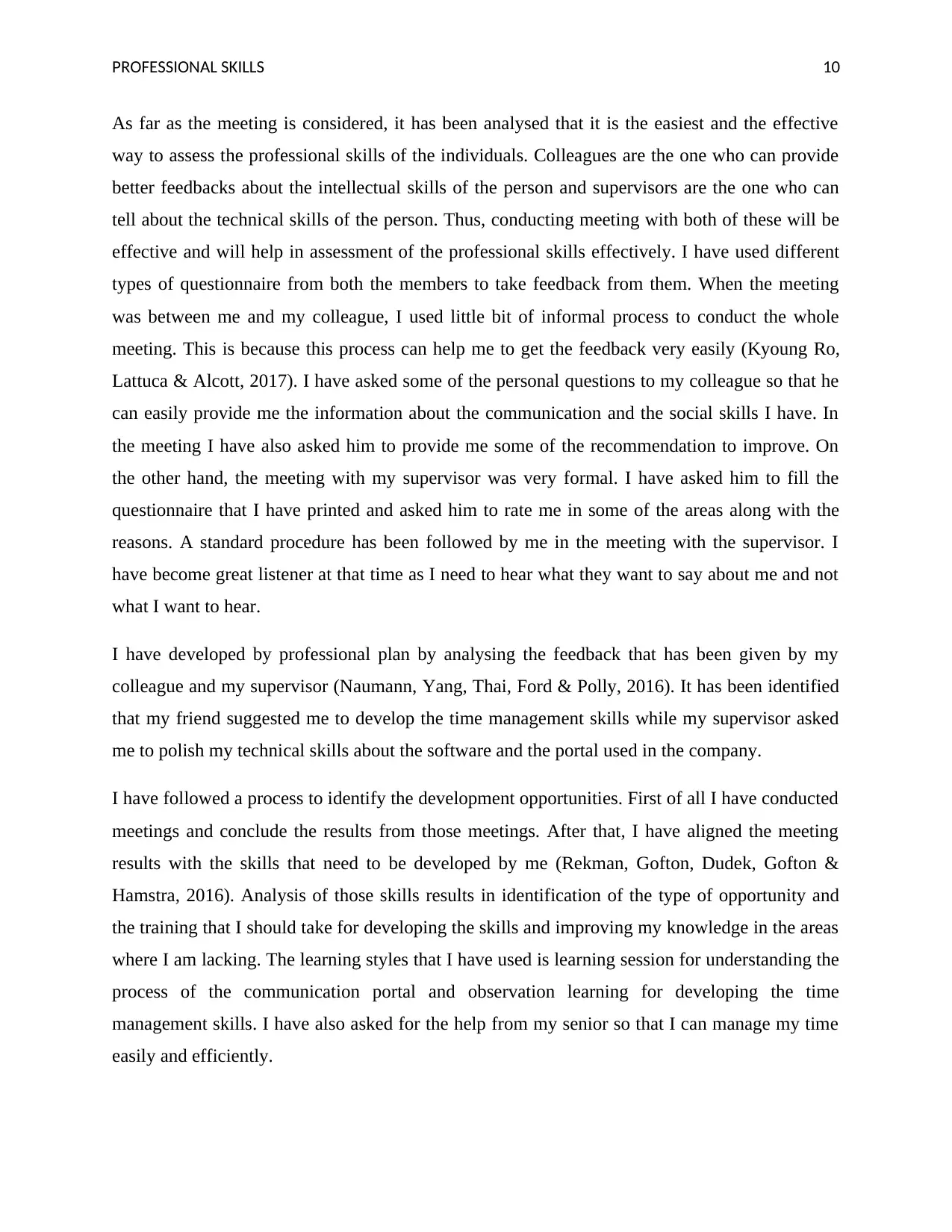
PROFESSIONAL SKILLS 10
As far as the meeting is considered, it has been analysed that it is the easiest and the effective
way to assess the professional skills of the individuals. Colleagues are the one who can provide
better feedbacks about the intellectual skills of the person and supervisors are the one who can
tell about the technical skills of the person. Thus, conducting meeting with both of these will be
effective and will help in assessment of the professional skills effectively. I have used different
types of questionnaire from both the members to take feedback from them. When the meeting
was between me and my colleague, I used little bit of informal process to conduct the whole
meeting. This is because this process can help me to get the feedback very easily (Kyoung Ro,
Lattuca & Alcott, 2017). I have asked some of the personal questions to my colleague so that he
can easily provide me the information about the communication and the social skills I have. In
the meeting I have also asked him to provide me some of the recommendation to improve. On
the other hand, the meeting with my supervisor was very formal. I have asked him to fill the
questionnaire that I have printed and asked him to rate me in some of the areas along with the
reasons. A standard procedure has been followed by me in the meeting with the supervisor. I
have become great listener at that time as I need to hear what they want to say about me and not
what I want to hear.
I have developed by professional plan by analysing the feedback that has been given by my
colleague and my supervisor (Naumann, Yang, Thai, Ford & Polly, 2016). It has been identified
that my friend suggested me to develop the time management skills while my supervisor asked
me to polish my technical skills about the software and the portal used in the company.
I have followed a process to identify the development opportunities. First of all I have conducted
meetings and conclude the results from those meetings. After that, I have aligned the meeting
results with the skills that need to be developed by me (Rekman, Gofton, Dudek, Gofton &
Hamstra, 2016). Analysis of those skills results in identification of the type of opportunity and
the training that I should take for developing the skills and improving my knowledge in the areas
where I am lacking. The learning styles that I have used is learning session for understanding the
process of the communication portal and observation learning for developing the time
management skills. I have also asked for the help from my senior so that I can manage my time
easily and efficiently.
As far as the meeting is considered, it has been analysed that it is the easiest and the effective
way to assess the professional skills of the individuals. Colleagues are the one who can provide
better feedbacks about the intellectual skills of the person and supervisors are the one who can
tell about the technical skills of the person. Thus, conducting meeting with both of these will be
effective and will help in assessment of the professional skills effectively. I have used different
types of questionnaire from both the members to take feedback from them. When the meeting
was between me and my colleague, I used little bit of informal process to conduct the whole
meeting. This is because this process can help me to get the feedback very easily (Kyoung Ro,
Lattuca & Alcott, 2017). I have asked some of the personal questions to my colleague so that he
can easily provide me the information about the communication and the social skills I have. In
the meeting I have also asked him to provide me some of the recommendation to improve. On
the other hand, the meeting with my supervisor was very formal. I have asked him to fill the
questionnaire that I have printed and asked him to rate me in some of the areas along with the
reasons. A standard procedure has been followed by me in the meeting with the supervisor. I
have become great listener at that time as I need to hear what they want to say about me and not
what I want to hear.
I have developed by professional plan by analysing the feedback that has been given by my
colleague and my supervisor (Naumann, Yang, Thai, Ford & Polly, 2016). It has been identified
that my friend suggested me to develop the time management skills while my supervisor asked
me to polish my technical skills about the software and the portal used in the company.
I have followed a process to identify the development opportunities. First of all I have conducted
meetings and conclude the results from those meetings. After that, I have aligned the meeting
results with the skills that need to be developed by me (Rekman, Gofton, Dudek, Gofton &
Hamstra, 2016). Analysis of those skills results in identification of the type of opportunity and
the training that I should take for developing the skills and improving my knowledge in the areas
where I am lacking. The learning styles that I have used is learning session for understanding the
process of the communication portal and observation learning for developing the time
management skills. I have also asked for the help from my senior so that I can manage my time
easily and efficiently.
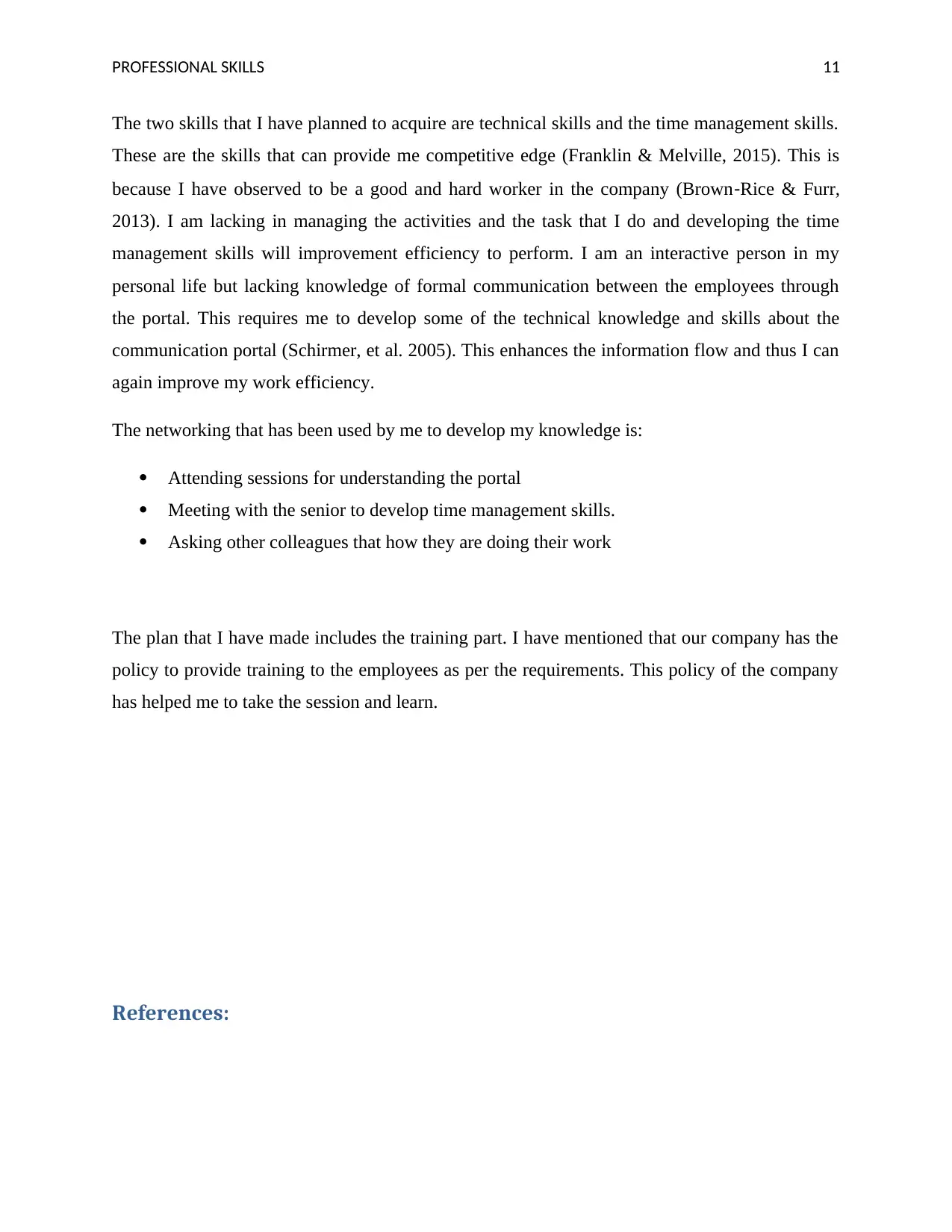
PROFESSIONAL SKILLS 11
The two skills that I have planned to acquire are technical skills and the time management skills.
These are the skills that can provide me competitive edge (Franklin & Melville, 2015). This is
because I have observed to be a good and hard worker in the company (Brown‐Rice & Furr,
2013). I am lacking in managing the activities and the task that I do and developing the time
management skills will improvement efficiency to perform. I am an interactive person in my
personal life but lacking knowledge of formal communication between the employees through
the portal. This requires me to develop some of the technical knowledge and skills about the
communication portal (Schirmer, et al. 2005). This enhances the information flow and thus I can
again improve my work efficiency.
The networking that has been used by me to develop my knowledge is:
Attending sessions for understanding the portal
Meeting with the senior to develop time management skills.
Asking other colleagues that how they are doing their work
The plan that I have made includes the training part. I have mentioned that our company has the
policy to provide training to the employees as per the requirements. This policy of the company
has helped me to take the session and learn.
References:
The two skills that I have planned to acquire are technical skills and the time management skills.
These are the skills that can provide me competitive edge (Franklin & Melville, 2015). This is
because I have observed to be a good and hard worker in the company (Brown‐Rice & Furr,
2013). I am lacking in managing the activities and the task that I do and developing the time
management skills will improvement efficiency to perform. I am an interactive person in my
personal life but lacking knowledge of formal communication between the employees through
the portal. This requires me to develop some of the technical knowledge and skills about the
communication portal (Schirmer, et al. 2005). This enhances the information flow and thus I can
again improve my work efficiency.
The networking that has been used by me to develop my knowledge is:
Attending sessions for understanding the portal
Meeting with the senior to develop time management skills.
Asking other colleagues that how they are doing their work
The plan that I have made includes the training part. I have mentioned that our company has the
policy to provide training to the employees as per the requirements. This policy of the company
has helped me to take the session and learn.
References:
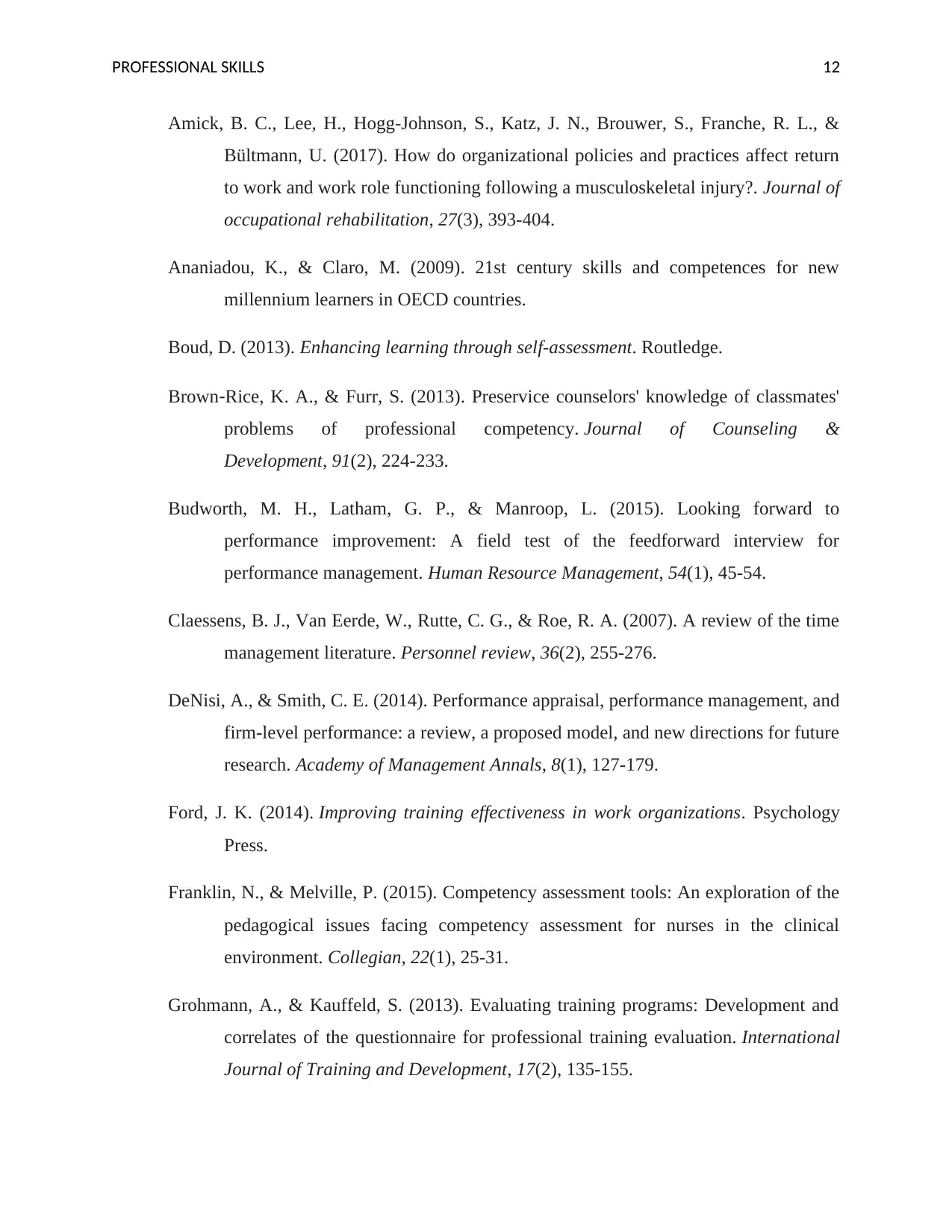
PROFESSIONAL SKILLS 12
Amick, B. C., Lee, H., Hogg-Johnson, S., Katz, J. N., Brouwer, S., Franche, R. L., &
Bültmann, U. (2017). How do organizational policies and practices affect return
to work and work role functioning following a musculoskeletal injury?. Journal of
occupational rehabilitation, 27(3), 393-404.
Ananiadou, K., & Claro, M. (2009). 21st century skills and competences for new
millennium learners in OECD countries.
Boud, D. (2013). Enhancing learning through self-assessment. Routledge.
Brown‐Rice, K. A., & Furr, S. (2013). Preservice counselors' knowledge of classmates'
problems of professional competency. Journal of Counseling &
Development, 91(2), 224-233.
Budworth, M. H., Latham, G. P., & Manroop, L. (2015). Looking forward to
performance improvement: A field test of the feedforward interview for
performance management. Human Resource Management, 54(1), 45-54.
Claessens, B. J., Van Eerde, W., Rutte, C. G., & Roe, R. A. (2007). A review of the time
management literature. Personnel review, 36(2), 255-276.
DeNisi, A., & Smith, C. E. (2014). Performance appraisal, performance management, and
firm-level performance: a review, a proposed model, and new directions for future
research. Academy of Management Annals, 8(1), 127-179.
Ford, J. K. (2014). Improving training effectiveness in work organizations. Psychology
Press.
Franklin, N., & Melville, P. (2015). Competency assessment tools: An exploration of the
pedagogical issues facing competency assessment for nurses in the clinical
environment. Collegian, 22(1), 25-31.
Grohmann, A., & Kauffeld, S. (2013). Evaluating training programs: Development and
correlates of the questionnaire for professional training evaluation. International
Journal of Training and Development, 17(2), 135-155.
Amick, B. C., Lee, H., Hogg-Johnson, S., Katz, J. N., Brouwer, S., Franche, R. L., &
Bültmann, U. (2017). How do organizational policies and practices affect return
to work and work role functioning following a musculoskeletal injury?. Journal of
occupational rehabilitation, 27(3), 393-404.
Ananiadou, K., & Claro, M. (2009). 21st century skills and competences for new
millennium learners in OECD countries.
Boud, D. (2013). Enhancing learning through self-assessment. Routledge.
Brown‐Rice, K. A., & Furr, S. (2013). Preservice counselors' knowledge of classmates'
problems of professional competency. Journal of Counseling &
Development, 91(2), 224-233.
Budworth, M. H., Latham, G. P., & Manroop, L. (2015). Looking forward to
performance improvement: A field test of the feedforward interview for
performance management. Human Resource Management, 54(1), 45-54.
Claessens, B. J., Van Eerde, W., Rutte, C. G., & Roe, R. A. (2007). A review of the time
management literature. Personnel review, 36(2), 255-276.
DeNisi, A., & Smith, C. E. (2014). Performance appraisal, performance management, and
firm-level performance: a review, a proposed model, and new directions for future
research. Academy of Management Annals, 8(1), 127-179.
Ford, J. K. (2014). Improving training effectiveness in work organizations. Psychology
Press.
Franklin, N., & Melville, P. (2015). Competency assessment tools: An exploration of the
pedagogical issues facing competency assessment for nurses in the clinical
environment. Collegian, 22(1), 25-31.
Grohmann, A., & Kauffeld, S. (2013). Evaluating training programs: Development and
correlates of the questionnaire for professional training evaluation. International
Journal of Training and Development, 17(2), 135-155.
Paraphrase This Document
Need a fresh take? Get an instant paraphrase of this document with our AI Paraphraser
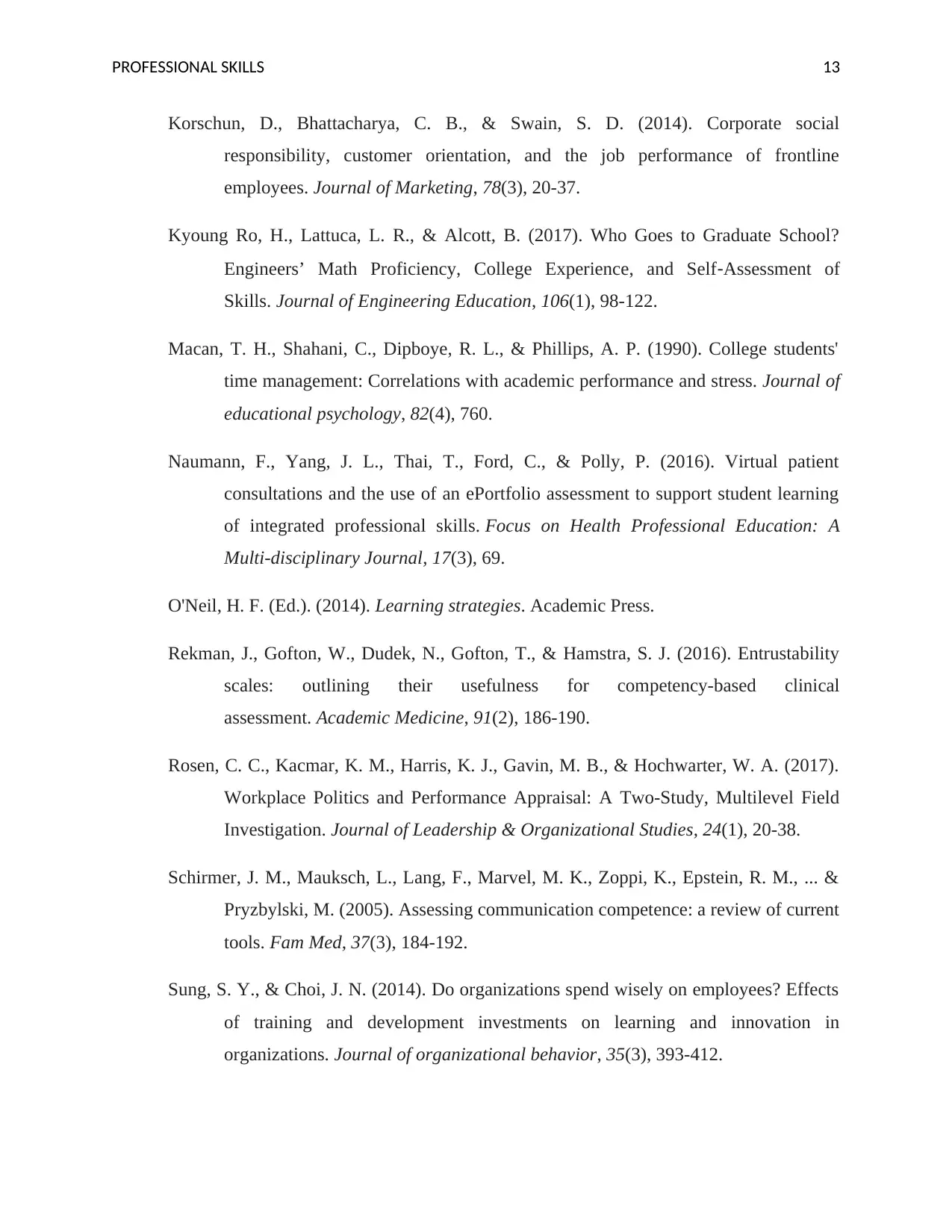
PROFESSIONAL SKILLS 13
Korschun, D., Bhattacharya, C. B., & Swain, S. D. (2014). Corporate social
responsibility, customer orientation, and the job performance of frontline
employees. Journal of Marketing, 78(3), 20-37.
Kyoung Ro, H., Lattuca, L. R., & Alcott, B. (2017). Who Goes to Graduate School?
Engineers’ Math Proficiency, College Experience, and Self‐Assessment of
Skills. Journal of Engineering Education, 106(1), 98-122.
Macan, T. H., Shahani, C., Dipboye, R. L., & Phillips, A. P. (1990). College students'
time management: Correlations with academic performance and stress. Journal of
educational psychology, 82(4), 760.
Naumann, F., Yang, J. L., Thai, T., Ford, C., & Polly, P. (2016). Virtual patient
consultations and the use of an ePortfolio assessment to support student learning
of integrated professional skills. Focus on Health Professional Education: A
Multi-disciplinary Journal, 17(3), 69.
O'Neil, H. F. (Ed.). (2014). Learning strategies. Academic Press.
Rekman, J., Gofton, W., Dudek, N., Gofton, T., & Hamstra, S. J. (2016). Entrustability
scales: outlining their usefulness for competency-based clinical
assessment. Academic Medicine, 91(2), 186-190.
Rosen, C. C., Kacmar, K. M., Harris, K. J., Gavin, M. B., & Hochwarter, W. A. (2017).
Workplace Politics and Performance Appraisal: A Two-Study, Multilevel Field
Investigation. Journal of Leadership & Organizational Studies, 24(1), 20-38.
Schirmer, J. M., Mauksch, L., Lang, F., Marvel, M. K., Zoppi, K., Epstein, R. M., ... &
Pryzbylski, M. (2005). Assessing communication competence: a review of current
tools. Fam Med, 37(3), 184-192.
Sung, S. Y., & Choi, J. N. (2014). Do organizations spend wisely on employees? Effects
of training and development investments on learning and innovation in
organizations. Journal of organizational behavior, 35(3), 393-412.
Korschun, D., Bhattacharya, C. B., & Swain, S. D. (2014). Corporate social
responsibility, customer orientation, and the job performance of frontline
employees. Journal of Marketing, 78(3), 20-37.
Kyoung Ro, H., Lattuca, L. R., & Alcott, B. (2017). Who Goes to Graduate School?
Engineers’ Math Proficiency, College Experience, and Self‐Assessment of
Skills. Journal of Engineering Education, 106(1), 98-122.
Macan, T. H., Shahani, C., Dipboye, R. L., & Phillips, A. P. (1990). College students'
time management: Correlations with academic performance and stress. Journal of
educational psychology, 82(4), 760.
Naumann, F., Yang, J. L., Thai, T., Ford, C., & Polly, P. (2016). Virtual patient
consultations and the use of an ePortfolio assessment to support student learning
of integrated professional skills. Focus on Health Professional Education: A
Multi-disciplinary Journal, 17(3), 69.
O'Neil, H. F. (Ed.). (2014). Learning strategies. Academic Press.
Rekman, J., Gofton, W., Dudek, N., Gofton, T., & Hamstra, S. J. (2016). Entrustability
scales: outlining their usefulness for competency-based clinical
assessment. Academic Medicine, 91(2), 186-190.
Rosen, C. C., Kacmar, K. M., Harris, K. J., Gavin, M. B., & Hochwarter, W. A. (2017).
Workplace Politics and Performance Appraisal: A Two-Study, Multilevel Field
Investigation. Journal of Leadership & Organizational Studies, 24(1), 20-38.
Schirmer, J. M., Mauksch, L., Lang, F., Marvel, M. K., Zoppi, K., Epstein, R. M., ... &
Pryzbylski, M. (2005). Assessing communication competence: a review of current
tools. Fam Med, 37(3), 184-192.
Sung, S. Y., & Choi, J. N. (2014). Do organizations spend wisely on employees? Effects
of training and development investments on learning and innovation in
organizations. Journal of organizational behavior, 35(3), 393-412.
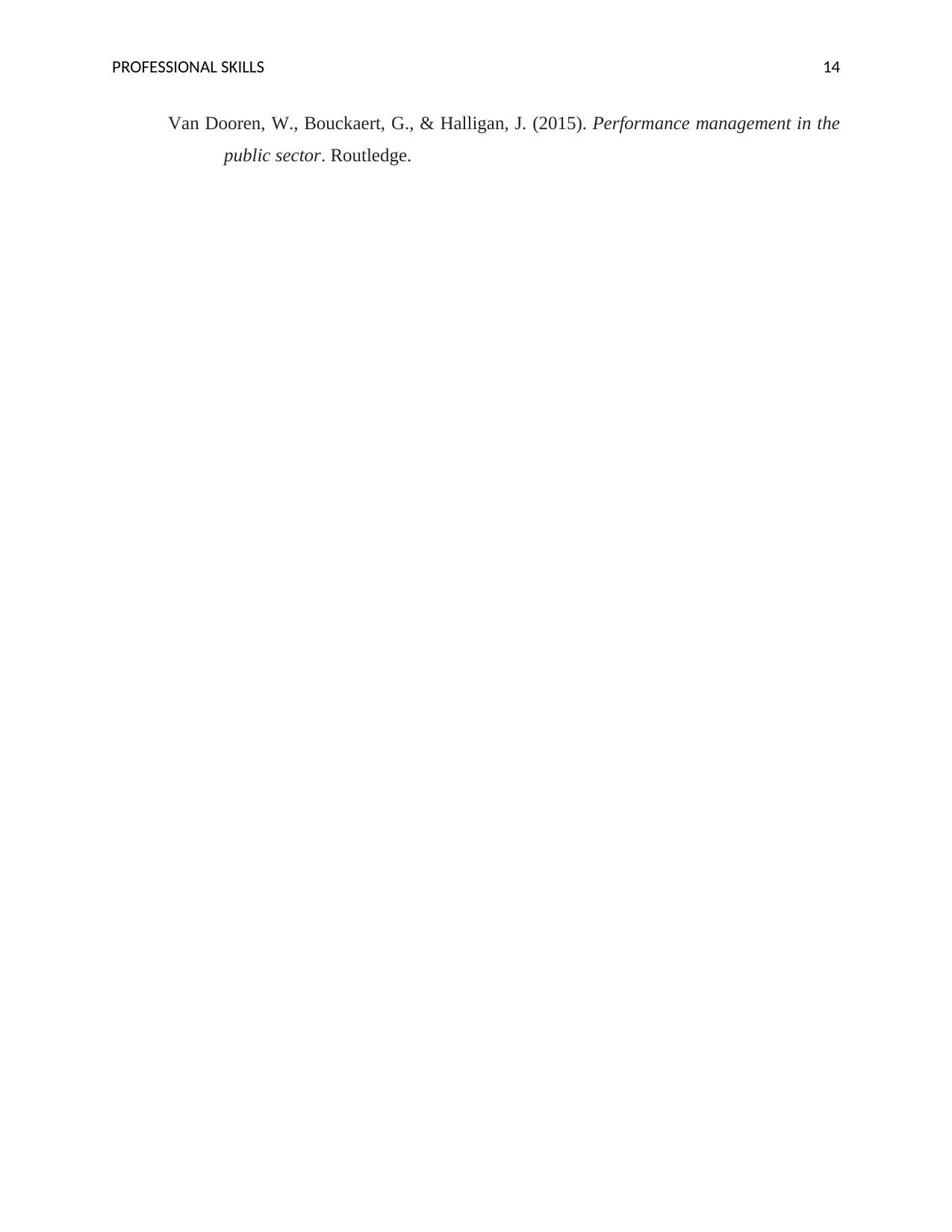
PROFESSIONAL SKILLS 14
Van Dooren, W., Bouckaert, G., & Halligan, J. (2015). Performance management in the
public sector. Routledge.
Van Dooren, W., Bouckaert, G., & Halligan, J. (2015). Performance management in the
public sector. Routledge.
1 out of 15
Related Documents
Your All-in-One AI-Powered Toolkit for Academic Success.
+13062052269
info@desklib.com
Available 24*7 on WhatsApp / Email
![[object Object]](/_next/static/media/star-bottom.7253800d.svg)
Unlock your academic potential
© 2024 | Zucol Services PVT LTD | All rights reserved.





